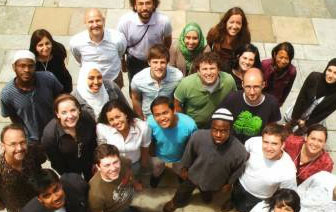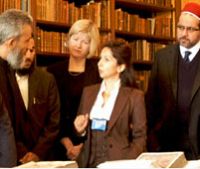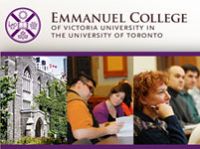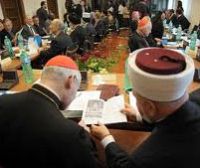Introduction to A Common Word Between Us and You
On October 13th 2006, one month to the day after Pope Benedict XVI’s Regensburg address of September 13th 2006, 38 Islamic authorities and scholars from around the world, representing all denominations and schools of thought, joined together to deliver an answer to the Pope in the spirit of open intellectual exchange and mutual understanding. In their Open Letter to the Pope , for the first time in recent history, Muslim scholars from every branch of Islam spoke with one voice about the true teachings of Islam.
Exactly one year after that letter, on October 13th 2007 Muslims expanded their message. In A Common Word Between Us and You, 138 Muslim scholars, clerics and intellectuals have unanimously come together for the first time since the days of the Prophet ( صلى الله عليه وسلم ) to declare the common ground between Christianity and Islam. Like the Open Letter, the signatories to this message come from every denomination and school of thought in Islam. Every major Islamic country or region in the world is represented in this message, which is addressed to the leaders of all the world’s churches, and indeed to all Christians everywhere.
The final form of the letter was presented at a conference in September 2007 held under the theme of “Love in the Quran,” by the Royal Academy of The Royal Aal al-Bayt Institute for Islamic Thought in Jordan, under the Patronage of H.M. King Abdullah II. Indeed, the most fundamental common ground between Islam and Christianity, and the best basis for future dialogue and understanding, is the love of God and the love of the neighbor.
Never before have Muslims delivered this kind of definitive consensus statement on Christianity. Rather than engage in polemic, the signatories have adopted the traditional and mainstream Islamic position of respecting the Christian scripture and calling Christians to be more, not less, faithful to it.
It is hoped that this document will provide a common constitution for the many worthy organizations and individuals who are carrying out interfaith dialogue all over the world. Often these groups are unaware of each other, and duplicate each other’s efforts. Not only can A Common Word Between Us give them a starting point for cooperation and worldwide co-ordination, but it does so on the most solid theological ground possible: the teachings of the Qu’ran and the Prophet ( صلى الله عليه وسلم ), and the commandments described by Jesus Christ (عليه سلام) in the Bible. Thus despite their differences, Islam and Christianity not only share the same Divine Origin and the same Abrahamic heritage, but the same two greatest commandments.

A New Approach
ACADEMIC INSTITUTIONS TEACHING A COMMON WORD

CAMBRIDGE UNIVERSITY
Cambridge Summer Interfaith Program at Cambridge University
YALE UNIVERSITY
The Reconciliation Program – Yale University
UNIVERSITY OF TORONTO, VICTORIA UNIVERSITY
The Canadian Certificate in Muslim StudiesThe Canadian Certificate in Muslim Studies project emerged in a context of interfaith friendship and Christian hospitality. Nevin Reda El-Tahry, currently the program’s coordinator, worked over the course of a year with Emmanuel College and Victoria University to invite participation from a variety of Muslim persons and organizations. Over time, the discussion included many people and spoke of a need within the Muslim community: Muslim leadership can benefit from education examining common commitments between Muslim values and the pluralistic context within Canada, and issues treated by the Canadian Charter of Rights and Freedom.
Department: Emmanuel College. A Common Word, That We May Know Each Other.
By: Dr. Zijad Delic . Rev. Dr. Bruce Gregersen.
Part of the Canadian Certificate in Muslim Studies.

HUMBOLDT UNIVERSITÄT ZU BERLIN
Übung/Seminar: A Common Word Between Us and You
Department: Religious Studies and Intercultural Theology (Theological Faculty)
By: Sarah Markiewicz. (Germany). (Spring 2012)

HARTFORD SEMINARY
Renewal of Muslim Theology: “A Common Word” and the Theology of Compassion (TH-686)”The course offers a brief survey of traditional Muslim Theology (Kalam) and recent attempts at its renewal (New Kalam). Invoking often neglected resources within the Muslim tradition, and dialogically engaging contributions from Jewish, Christian, and Buddhist theological quests, a new Ash’arite Theology of Compassion is then offered for discussion and elaboration. The “A Common Word” initiative is invoked as a solid foundation for compassion-centered theology and preaching, and the need for personal and institutional networking towards a Compassion Architecture is then explored.

TONY BLAIR FAITH FOUNDATION
TB Faith FoundationBringing 12-17 year old students together all over the world using digital technology. 70 schools in India have undertaken the programme with over a thousand pupils participating and 345 teachers trained. Students have connected with schools all over the world including the USA, UK, Australia, Jordan, United Arab Emirates, Lebanon, Indonesia, and Pakistan

